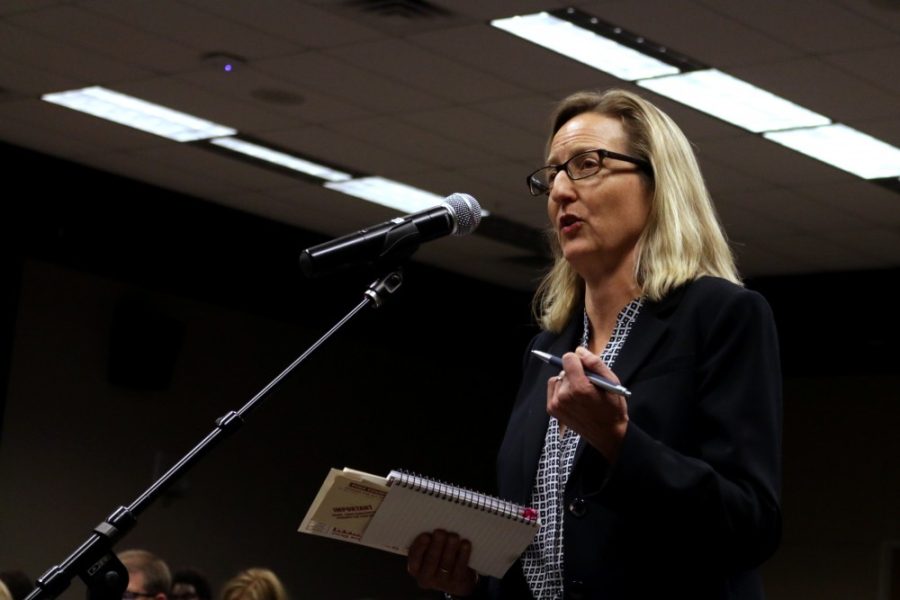When times get tough, UA environmental law professor Kirsten Engel usually throws on her sneakers and goes for a run around town. But this time, she’s running for the Arizona House of Representatives.
Engel learned last year that one of the Arizona House representatives, Bruce Wheeler, would not be running for re-election in the fall. She decided to take the opportunity to run for the position herself and make a stand against continuing cuts to education.
Engel, a UA faculty member since 2005, has been a big presence in the James E. Rogers College of Law, where she previously served as associate dean for academic affairs and helped students create the Arizona Journal of Environmental Law and Policy. She also helped begin a certificate program that allows law students to demonstrate their interest in environmental law to future employers.
“She is really passionate in working with students on environmental issues,” said Andrea Logue, third-year law student and editor-in-chief of theArizona Journal of Environmental Law and Policy.
Despite Engel’s extensive background in environmental law, including a short stint at the U.S. Environmental Protection Agency, she said it was the continued state cuts to education funding that compelled her to run for public office.
“The biggest motivation for me running for public office is the fact that I feel like I’m living our state’s unwillingness to adequately fund public education,” Engel said. “Both in my professional life here at the university and also in my personal life, being the mother of a kid in public school.”
The professor appeared before UA President Ann Weaver Hart and the Arizona Board of Regents at the tuition hearing on March 29 to ask that the regents and presidents of Arizona’s three public universities continue to advocate for more state support from the Arizona government.
She was the only UA faculty member to speak at the tuition hearing.
“Since I came here to the university in 2005, … tuition has more than doubled,” Engel said to Hart and the board members. “I believe that’s really putting the university education out of reach for so many working families.”
Engel grew up in Chicago and experienced the power of funding the public school system first-hand. She saw great disparities between the low-income grade school she attended when compared to other public schools around Chicago and outside Illinois.
In order to provide students across Arizona, including those in grade school, with more opportunities and resources, Engel said she would advocate for increased state funding to education.
Engel is a member of the site council at her daughter’s elementary school and said she saw how strained the public schools are when the council struggled to find enough funding to create a much-needed after-school tutoring program.
Arizona came in 50th for state funding alone per student in K-12 in 2013, according to U.S. Census data. With Arizona now facing its first surplus since the 2007 recession, Engel sees no reason that education funding should not increase.
If the Joint Legislative Budget Committee’s baseline predictions are right, Arizona will finish fiscal year 2017 with a surplus of $26 million.
“The refusal to allocate that surplus to education, I think, is the first travesty that we’re facing and it’s the universities, it’s K-12 education and it’s the community colleges that all need to be funded,” Engel said.
She added that funds could still be allocated to education from elsewhere, specifically from the criminal justice system, without the surplus money.
This year alone, Arizona will spend almost 60 percent more from the General Fund on prisons than on universities, according to the non-profit research center the Grand Canyon Institute.
The funding of state prisons was a hot topic at a town hall held by Arizona lawmakers at the UA on March 3, and received attention recently after Gov. Doug Ducey signed a bill on March 31 that requires all undocumented immigrants convicted of crimes to serve at least 85 percent of their sentence before deportationas is required of all other Arizonans.
This law could cost Arizona an additional $16.7 million each year to keep the undocumented prisoners in jail for the longer sentence, according to the Arizona Republic. Arizona is one of only three states that require nonviolent offenders to serve at least 85 percent of their sentence behind bars.
Engel said she believes Arizona could be doing more to make use of its resources, primarily its sunshine. She is interested in attracting more solar-minded businesses to Arizona.
Solar power research, manufacturing solar panels and batteries, and working to improve solar storage systems are all activities Engel sees more potential for in the Grand Canyon State.
“There’s really no reason that Arizona can’t be the solar capital of the world,” she said.
With her strong stance on education and her environmental know how, Engel hopes to appeal to voters in District 10, win a seat in the house and continue as a professor at the College of Law.
Follow Michelle Jaquette on Twitter









